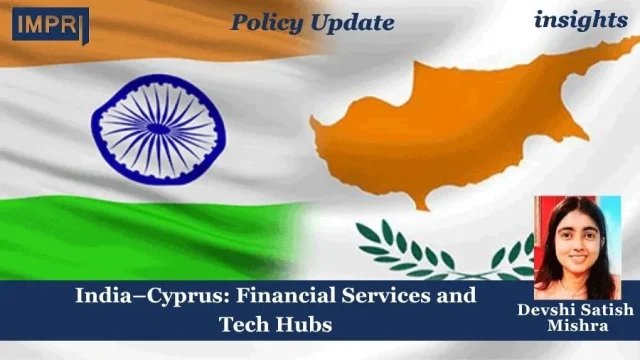Policy Update
Devshi Satish Mishra
Background
India and Cyprus have always enjoyed good bilateral relations. The foundation of this long-standing relationship was laid by the first President of RoC (Republic of Cyprus), Archbishop Makarios, and the first Prime Minister of India, Pandit Jawaharlal Nehru. They were among the pioneers of the Non-Aligned Movement (NAM), who realised the dreams and aspirations of their respective people for self-determination and nationhood. India also rendered support to the Cypriot struggle against British colonialism, which was also deeply appreciated by President Archbishop Makarios. Diplomatic ties between India and RoC came into effect in 1962, two years after Cyprus became independent from British colonial rule.
Over the decades, both countries have adhered to diplomatic values, norms, and principles governing the conduct of statesʼ’ international affairs. Moreover, both countries share similar positions on major regional and international issues and have collaborated constructively in the United Nations, the Commonwealth, and other international forums.
Additionally, both India and the RoC support each other on their respective issues. On one hand, India has consistently endorsed the solution of the Cyprus issue based on UNSC resolutions, international law, and the EU acquis. India supports a bi-zonal bi-communal federation based on UN Resolutions as a solution to the Cyprus problem (Cyprus problem refers to the long-standing dispute over the division of the island of Cyprus between its Greek Cypriot majority and Turkish Cypriot minority). On the other hand, RoC has also supported India in numerous international bodies. It supports Indiaʼs candidature as a permanent member of the expanded UN Security Council. It has also extended its full support for the India-US Civil Nuclear Agreement, within the Nuclear Supplier Group (NSG) and the International Atomic Energy Agency (IAEA), which helps India address its increasing energy needs and benefit its economic development.
High-level visits have also strengthened the relationship. Several Indian Presidents, Vice Presidents, and Foreign Ministers have visited Cyprus, while Cypriot leaders have visited India on multiple occasions, underscoring the warmth and continuity of the partnership. Over time, cooperation has gradually expanded from political solidarity to areas such as trade, education, and culture, paving the way for stronger economic and technological collaboration in recent decades.
In 2022, the two countries celebrated the 60th anniversary of diplomatic relations, marking six decades of friendship and reaffirming their commitment to deepening cooperation in both traditional and emerging sectors.
Functioning
Economic and financial cooperation has emerged as one of the strongest pillars of India-Cyprus relations. Bilateral trade between the two countries has grown steadily over the years. Cyprus acts as India’s strategic gateway to the European Union, thanks to its favorable business environment, regulatory framework, and well-developed financial services sector. It is not just a small Mediterranean country for India, but an important partner for India in Europe. The strength of existing Economic and Financial ties between the two countries can be understood from the following points:
- RoC is among the top 10 investors in India with cumulative investments of USD
14.65 billion during April 2000 – March 2025, according to DPIIT estimates, making Cyprus one of the largest investors in India from the EU region. These investments, as FDI equity inflows, were in sectors including services, computer and software, auto manufacturing, manufacturing industries, real estate, cargo handling, construction, shipping, and pharmaceuticals.
- In April 1989, India and RoC signed an agreement on Economic, Trade, Scientific, and Industrial Cooperation, leading to the establishment of the Joint Economic Committee (JEC).
- On 16th September 2005, the Cyprus-India Business Association (CIBA) was established to strengthen economic ties between RoC and India by promoting trade, investment, and business partnerships. High Commission, in partnership with CIBA, organizes various commercial/economic events to promote bilateral economic engagement.
- In December 2021, Invest India and Invest Cyprus signed an MOU with the intention of enhancing their mutual investment activities and promoting overall business cooperation between Indian and Cypriot companies. To implement the MoU, the first meeting between Invest India and Invest Cyprus was held virtually in November 2023.
- RoC was classified in Funds as Foreign Portfolio Investors (FPIs) eligible for a Category-I license. It is one of the three countries, outside FATF (Financial Action Task Force) countries, to obtain such an approval from India. This classification offers facilitation of Investment funds from the RoC for investors and asset managers in the Indian markets.
The best example of the close relationship between the two countries is the fact that two Cypriot shipping companies – Interorient Navigation and Danship and Partners – have announced a collaboration to invest Rs 10,000 crore in the Indian shipping sector, which is by far the largest ever FDI in India’s shipping sector since this sector was opened to 100% FDI in 2005.
Performance and Impact
Owing to a strong relationship between the two countries and multiple high-level agreements and MoUs signed, Cyprus can act as a keystone for attracting, managing, structuring, and channeling trade and investment flows into Europe and India while offering a conducive and efficient setup to foreign entities. Towards these ends, it can capitalise on the country’s intrinsic strengths linked to its business climate, investment-grade status, compliance with international norms and standards, regulatory framework, political and social stability, investment protection conventions, flight connectivity, infrastructure set-up, and highly skilled workforce.
The historical goodwill, strong diplomatic ties, and steady institutional framework between India and Cyprus provide a solid foundation for future cooperation. Earlier decades of this relationship focused on cultural connections and support in international forums. Today, the relationship has shifted to emphasize strategic areas like financial services, renewable energy, technology, and shipping. India’s large, dynamic market and Cyprus’s position as a reliable financial center in the European Union make them natural partners in the evolving global economy. Besides its strengths in financial services, Cyprus is also becoming a hub for technology, research, and innovation.
- Cyprus is an increasingly attractive hub for fintech companies, offering a business-friendly environment, a competitive 12.5 per cent corporate tax rate – the lowest in the EU – and extensive double tax treaties with over 65 countries.
- Strategic proximity to Europe, Africa, and Asia provides access to diverse markets, while robust digital infrastructure and a strong regulatory framework support international operations.
- Additional incentives, such as a 2.5 per cent tax on profits under the IP Box Regime and no capital gains tax on securities sales, make Cyprus especially advantageous for fintech firms.
- A skilled, English-speaking workforce, where 55% have a tertiary education degree, further enhances its appeal as a tech and innovation hub.
- Another important advantage for fintech companies in Cyprus is access to the Single Market and EU passporting rights, enabling firms licensed in Cyprus to operate seamlessly across 27 member states.
- There have been major upgrades from all leading credit rating agencies, including Moody’s recent upgrade of the Cyprus economy to A3, which is a significant recognition of the country’s economic resilience and growth potential.
- The technology sector, which includes fintech, has seen significant growth in Cyprus, with investments reaching €3.3 billion in 2022 and €4 billion in 2023, contributing 15 per cent to the GDP.
- Cyprus ranks fourth in the EU for technology sector development, with over 800 tech companies, including numerous fintech firms, establishing a strong presence. This growth is fuelled by international companies and talent, making the sector a key contributor to the economy, accounting for over 10 per cent of GDP. Invest Cyprus supports this expansion by creating a business-friendly environment, attracting global investment, and providing essential support to both technology and fintech companies.
For Indian businesses, Cyprus presents a unique and accessible chance to enter European markets with a supportive environment for innovation. Several Indian IT and digital service companies have started looking at Cyprus as a strategic base for providing services within the EU framework.
Indian startups in fields like fintech, health tech, and e-commerce can take advantage of these efforts and use Cyprus as a stepping stone into the European market. The country has also made itself a base for regional headquarters of multinational tech firms, thanks to its strategic location at the crossroads of Europe, Asia, and Africa. For Indian companies with global goals, setting up operations in Cyprus not only improves visibility in Europe but also boosts their capacity to serve various international markets.
Emerging Issues
- Geopolitical Instability in the Eastern Mediterranean. The unresolved Cyprus problem (Greek Cypriot–Turkish Cypriot division) continues to be a sensitive issue. Rising tensions between Turkey, Greece, and Cyprus in the Eastern Mediterranean could affect Cyprus’s political stability and, indirectly, India’s investments and partnerships.
- EU Compliance and Regulatory Shifts. As part of the EU framework, Cyprus must constantly adapt to stricter financial regulations. Indian companies using Cyprus as a hub may face increasing compliance burdens and higher costs.
- Global Financial Volatility. Both India and Cyprus rely on capital inflows. Global financial crises, interest rate shocks, or instability in EU banking could reduce FDI and portfolio investments between the two countries.
- Technology and Cybersecurity Risks. With Cyprus becoming a fintech and innovation hub, issues such as data security, intellectual property theft, and cyberattacks become increasingly crucial. Indian startups operating there may face vulnerabilities if robust cybersecurity frameworks aren’t ensured.
- Sustainability and Green Growth Demands. Both India and Cyprus are under increasing pressure to align with global climate commitments. The shipping sector, a major area of Cyprus’s investment in India, faces stricter decarbonisation and environmental compliance norms, which could increase costs.
Way Forward
By merging India’s strong points in IT and innovation with Cyprus’ strategic role as a financial and tech center, both countries have the chance to build a forward-looking partnership. This collaboration could enhance competitiveness, support digital change, and generate long-term benefits for businesses and societies. They already enjoy good bilateral relations. By positioning themselves strategically in the global market, they can rely on each other’s strengths.
References
Columnist, G. (2023, February 2). Enhanced Cyprus-India business collaboration – Financial Mirror. Financial Mirror. https://www.financialmirror.com/2023/02/03/enhanced-cyprus-india-business-collaboration/
Cyprus – a strategic hub for innovation and growth. (n.d.). World Trade Centres Association. https://www.wtca.org/news/cyprus-a-strategic-hub-for-innovation-and-growth
Cyprus as a tech hub | Invest Cyprus. (2022, January 28). Invest Cyprus. https://www.investcyprus.org.cy/cyprus-as-a-tech-hub/
English rendering of Press Statement by Prime Minister Shri Narendra Modi at the Joint Press Briefing with the President of Cyprus. (n.d.). https://www.pib.gov.in/PressReleasePage.aspx?PRID=2137068
High Commission of the Republic of Cyprus in New Delhi – latest news. (n.d.). https://www.mfa.gov.cy/mfa/HighCom/HighCom_NewDelhi.nsf/All/0FA949618FD886FE75258114003E97E8?OpenDocument
Infotech, B., & Infotech, B. (2025, February 21). India-Cyprus Business Forum Conclave strengthens Bilateral Trade and Investment Opportunities – Bombay Chamber. Bombay Chamber https://bombaychamber.com/internal-news/india-cyprus-business-forum-conclave-strengthens-bilateral-trade-and-investment-opportunities/
Joint declaration on the implementation of the comprehensive partnership between the Republic of Cyprus and the Republic of India. (n.d.). https://www.pib.gov.in/PressReleasePage.aspx?PRID=2136635
Mkyriacou. (2025, June 25). Shri Manish: Indian enterprises are recognising Cyprus as a gateway to the European Union and beyond. Invest Cyprus. https://www.investcyprus.org.cy/shri-manish-indian-enterprises-are-recognising-cyprus-as-a-gateway-to-the-european-union-and-beyond/
Nehru, J., Archbishop Makarios, Nicos Anastasiades, Jaishankar, S., Nikos Christodoulides, Ioannis Kasoulides, Nicos Nouris, Nitya Nand Rai, Annita Demetriou, Constantinos Kombos, Shantanu Thakur, & Nicodemos Damianou. (n.d.). INDIA-CYPRUS BILATERAL RELATIONS. https://www.mea.gov.in/Portal/ForeignRelation/INDIA-CYPRUS-may-2025.pdf
Online, E. (2025, July 8). India to get Rs 10,000 crore from Cyprus firms in biggest maritime FDI since 2005. The Economic Times. https://economictimes.indiatimes.com/industry/transportation/shipping-/-transport/cyprus-shipping-giants-announce-rs-10000-crore-investment-marking-largest-fdi-in-indian-maritime-sector/articleshow/122317073.cms?from=mdr
PricewaterhouseCoopers. (n.d.). Prospects for enhanced Cyprus-India economic and business collaboration. PwC. https://www.pwc.com.cy/en/press-room/articles-2023/prospects-for-enhanced-cyprus-india-economic-and-business-collab.html
Republic of India & Republic of Cyprus. (1962). INDIA-CYPRUS BILATERAL RELATIONS. https://www.mea.gov.in/Portal/ForeignRelation/Bilateral-April-2024.pdf
About the Contributor
Devshi Satish Mishra is a Research Intern at IMPRI and a student at the University of Delhi pursuing Economics Honours.
Acknowledgement
The author sincerely thanks Ms. Aasthaba Jadeja and other IMPRI fellows for their valuable contribution.
Disclaimer
All views expressed in the article belong solely to the author and not necessarily to the organisation.
Read more on IMPRI
India-South Korea: Bilateral Tech Start-up Incubators
Climate Finance Politics: India’s Strategic Push Ahead of COP30



















